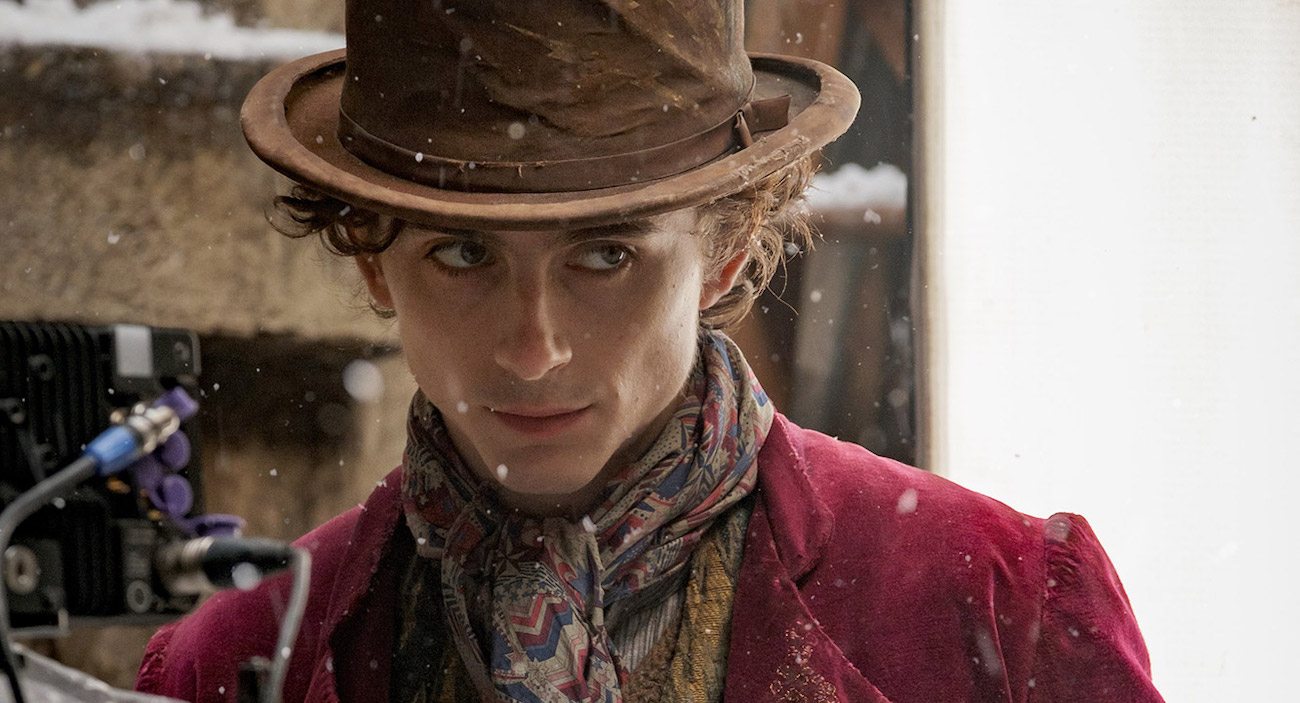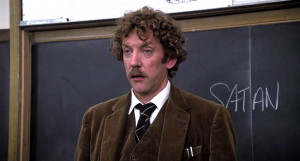
This article contains plenty of Wonka spoilers (plus more from Willy Wonka and the Chocolate Factory!).
There’s just something about the sight of a man in a plush plum coat dancing with a green-haired Oompa Loompa that is irresistible. Try as you might not to give in, even the dastardly chocolate cartel would smile if they saw the final scene of Wonka, which features Timothée Chalamet’s Willy tripping the light fantastic with a miniature Hugh Grant. Together, the pair are poised to build what will become Willy Wonka’s fabled chocolate factory. A place of pure imagination, as the song goes.
Laugh it up though Willy, your chocolate utopia is about to be smashed into a million shards.
Wonka director Paul King is clear that he wanted to be both faithful to Roald Dahl’s novel, but also to serve as a prequel to Gene Wilder’s Willy in Willy Wonka and the Chocolate Factory (1971). Not a direct lead in, obviously, but there’s certainly a through-line between Chalamet and Wilder’s characters. But lest we forget Wilder’s Wonka is quite a different guy, so what the hell happened to Willy?
Willy Wonka Loses His ‘Pure’ Imagination
Timothée Chalamet’s Willy Wonka is exuberant, shiny, and bright as a button. When we first meet him, he (briefly) has 12 silver coins in his pocket and a dream, and while he loses the former inside of 10 minutes, the latter never leaves. Chalamet’s Wonka is adorable. But Wilder’s is… not.
The Wilder Wonka might have a purple suit and an ear for a tune, but this is a man who is not awash with the milk of human kindness. In fact, he’s pretty damn judgy. While we will concede that the majority of the kids invited to his chocolate factory are spoiled and a bit awful, it does feel like Wonka is deliberately and gleefully brat-baiting.
Take his scheme to open the doors to his factory after his prolonged self-imposed exile, to five children from across the world who find golden tickets in chocolate bars, promising a lifetime supply of chocolate to each. This scheme very clearly favors the wealthy, the spoiled, and the gluttonous, and with the exception of Charlie, that’s what Wonka gets.
It’s almost like he wants to punish a bunch of kids for cardinal sins including chewing gum and watching too much TV. Even adorable little Charlie, who’s only infraction is drinking a bit of fizzy lifting drink (which Chalamet’s Wonka would surely have encouraged), gets shouted at and told, “You lose! You get nothing!”
Okay, in the end Charlie inherits the factory for passing a morality test—a man who he thinks is Slugworth has offered to give him money if he smuggles out an everlasting gobstopper but Charlie does not succumb. But seriously, what kind of douchebag asks the child of a family that is literally starving to choose loyalty to a shouty stranger over the wellbeing of his entire clan?
No way Chalamet’s Wonka is doing that. So what happened?! Whatever it was must have been bad, and we have a few places where it could start…
No More Noodle
In Wonka, the amazing chocolatier not only defeats the vile chocolate cartel, but makes a friend for life in a child as innocent as she is good-natured. Sweet, wee Noodle (Calah Lane) becomes a sister in all but name to Willy, helping him smuggle sweets to the masses and humoring his rantings about a little orange man.
So where is she in Willy Wonka and the Chocolate Factory? The girl for whom Willy cared enough about protecting that he agreed never to make chocolate again (under threat of blackmail) in Wonka is nowhere to be seen in his later years after he’s shut the world out. Did she leave the country? Turn her back on Willy after he went edgelord?
Or did she… did she die??
An even darker option is that she joins the Slugworth family business and in fact it is Noodle who betrays Willy and tries to steal his ideas? Oof that would be a rough twist.
Slugworth Gets Away with It
Yep, while the justice system is vindicated at the end of Wonka after Willy and Noodle bring the chocolate cartel’s nefarious schemes of bribery, blackmail, and murder to light, the good vibes are doomed to fade. Despite also getting Keegan-Michael Key’s ballooning Chief of Police arrested, nothing in this town sticks. Which is pretty ironic considering all those overflowing tunnels of caramel beneath their feet.
By the time Willy is middle-aged in the Wilder film, we know that Slugworth (Paterson Joseph in Wonka) is not only alive and well but a thriving rival who’s desperate to sneak his spies into Willy Wonka’s chocolate factory. So despite being caught red-handed, did Mr. Slugworth buy his way out of prison? And did he convince Noodle to come to the dark side?
If Wonka 2 has any guts, it should probably end with the exonerated Chief of Police saying, “Forget it, Willy, it’s Galeries Gourmet.”
Oompa Loompas Become an Enslaved Refugee Crisis
The darkest development which should occur between Wonka and Willy Wonka has nothing to do with Willy’s personal funk. It’s what happened to his indentured workforce that should make you shudder.
In King’s new movie, the Oompa Loompas are a happy indigenous race living on a tropical island that seems to have everything they need, minus a plentiful supply of cocoa beans. They’re wealthy enough that the lowliest of them, the shorty played by Hugh Grant, even travels first class on all his trips. So something horrible must have happened to them between films. And we’ve had hints.
“I said, ‘Come and live with me in peace and safety, away from all the Wangdoodles and Hornswogglers, and Snozzwangers, and rotten, Vermicious Knids,” Willy tells the children and their adult chaperones in Willy Wonka and the Chocolate Factory. These are the apparently carnivorous beasts that hunted the Oompa Loompas to near extinction and out of their once beloved home of Oompaland. But when you watch Wonka, nothing about Oompaland and its indigenous population looks horrifying. In fact, Oompa Loompa society is glorious.
So you know what that means. If we’re going to get an all singing and dancing workforce in Wonka 2, we’re going to first have to witness an Oompa Loompa massacre. A slaughter of orange people so ferocious that even their wisest elders will reasonably deduce their best choice is to agree to the dubious conditions required by Willy for them to work in his factory: lifetime servitude in exchange for a pittance of cocoa beans. It’s either that or they lean into Roald Dahl’s original literary vision of the Oompa Loompas in the 1964 edition of Charlie and the Chocolate Factory, where they were a fictional African tribe who are swindled into slavery in exchange for free chocolate… Yikes.
Willy Wonka Loses His Chocolate Touch
Finally, let’s be honest, Willy’s talent for chocolate did not reach the giddy heights his potential in Wonka hinted at. Chalamet’s Wonka is incredible. He can make folks fly with a single truffle. Elsewhere he reveals he’s developed a chocolate called Big Night Out. One bite of that and you’ll have the complete experience of a debauched evening on the town, complete with blackout and hangover.
Yet in Willy Wonka, his bottles of fizzy can never leave the experimental stage because he doesn’t know how to bring the customers down (Charlie and Grandpa Joe figure it out in the nick of time by burping), and Violet turns into a Blueberry because he cannot work out the kinks in his Thanksgiving dinner chewing gum.
When you get right down to it, almost nothing works in that factory. Mike Teevee may or may not be able to return to normal size (never trust anything Willy says at face value), and they’re not quite sure whether the furnaces are on or not when Verruca is sent down to the boiler. Frankly, Mr. Wonka, you’ve become a poor, poor chocolatier.
Maybe it was all those years alone, letting your miseries and slights curdle? But it’s pretty clear why you want to retire at a relatively young age… you’ve lost your mojo! Seeing that decline might be the most dispiriting effect of all should Wonka 2 ever open the factory’s doors.
The post 5 Reasons a Wonka Sequel Would Need to Be Dark as Hell appeared first on Den of Geek.










